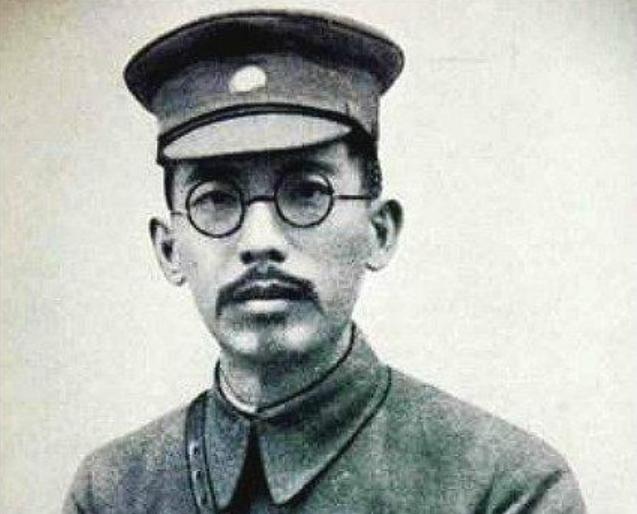History is the memory of things that have been said and done. —Carl Baker
Tang Shengzhi, a touch of eight-character thick beard, nicknamed "Meng Beard". Chiang Kai-shek wanted to marry him in order to win him over, and ordinary people could not ask for it, but Tang Shengzhi was dismissive and let Chiang Kai-shek eat soft nails. He raised troops against Chiang Kai-shek many times in his life, and in his heart he did not identify with this bald-headed leader.
Tang Shengzhi's other, louder nickname was "General of Buddhism." At the age of 35, he studied under the tantric master Gu Boxu and began to learn Buddhist self-cultivation. In addition to believing in Buddhism himself, he also used Buddhism to govern the army, requiring his subordinates to be ordained, each wearing a round badge, engraving the word "Buddha" on one side and "great compassion, saving people and saving the world" on the other, known as the "Buddha's Army", which is a great spectacle in the military circles.

In 1935, Tang Shengzhi was awarded the rank of first-class general of the army, and together with He Yingqin, Feng Yuxiang, Yan Xishan, Zhang Xueliang, Li Zongren, Zhu Peide, Chen Jitang, Chen Shaokuan, Cheng Qian, Bai Chongxi, Chen Cheng, and others, he became one of the twelve first-class generals (excluding posthumous awards) when the Kuomintang ruled the mainland, with a rank equivalent to that of a marshal of the People's Liberation Army.
Two years later, Japan launched the "July 7 Incident" and began to invade China in an all-round way. Tang Shengzhi was a staunch resistance faction, and the defense of Nanjing was imminent, so he took the initiative to ask Miao to be the supreme commander. During this period, he received two orders to retreat, but still held his position. As a result, he misdirected and led to a major rout. In the midst of the rebellion, Tang Shengzhi crossed the river by boat to evacuate, leaving hundreds of thousands of soldiers and civilians to fall into hell, which was met with great criticism. Tang Shengzhi resigned and returned to his hometown, while chanting sutras and reciting The Buddha, while cultivating talents and continuing the War of Resistance.
In the agrarian revolutionary war and the war of liberation, and even the War of Resistance Against Japan, the Kuomintang was eager to swallow the Communist Party alive, but Tang Shengzhi always adhered to his own concept, "Absolutely not hunting down and killing a Communist Party."
As early as 1922, Tang Shengzhi supported Sun Yat-sen's policy of "uniting with Russia, uniting with the Communist Party, and supporting peasants and workers.". In the autumn of 1927, the Nanchang Uprising and the Autumn Harvest Uprising troops met and requested the support of Tang Shengzhi's brother Tang Shengming due to lack of weapons and ammunition. After Tang Shengzhi learned the news, he immediately sent 300 rifles and nearly 10,000 rounds of ammunition under the pretext of escorting Tang Shengming back to Changsha.
When the War of Liberation broke out, Tang Shengzhi was resistant to Chiang Kai-shek's enthusiasm for civil war and reacted passively. In 1949, Tang Shengzhi went to Changsha to prepare for an uprising, and he said at the welcome banquet: "In order to unite the people of Hunan and protect the security of Hunan, I am willing to be friends with the people of the world." I came to Changsha this time to serve the 30 million people of Hunan. Then he organized the "Hunan People's Self-Help Association", controlled the local armed forces, successfully instigated the Hunan uprising, and made great contributions to peaceful liberation.
After the founding of New China, he successively served as a member of the National Committee of the Chinese People's Political Consultative Conference, vice chairman of the Hunan Provincial Government, member of the National Defense Commission, and vice governor of Hunan Province, and devoted himself to socialist construction.
Chiang Kai-shek naturally harbored a grudge against this anti-Georgian army general and issued a wanted warrant. However, at the end of the crossbow, it is impossible to enter Lu Mu, and Chiang Kai-shek's bias toward Taiwan has gone, and this kind of behavior is only a bluff and a futile increase in laughter.
In 1961, when Tang Shengzhi suffered from cancer and was operated on, Chen Yi visited him in the hospital and praised: "Sir, you are friends enough, among the generals at the level of the Kuomintang, you are the only one who has not fought with the Red Army and the People's Liberation Army." ”
In 1970, Tang Shengzhi died of illness at the age of 79.